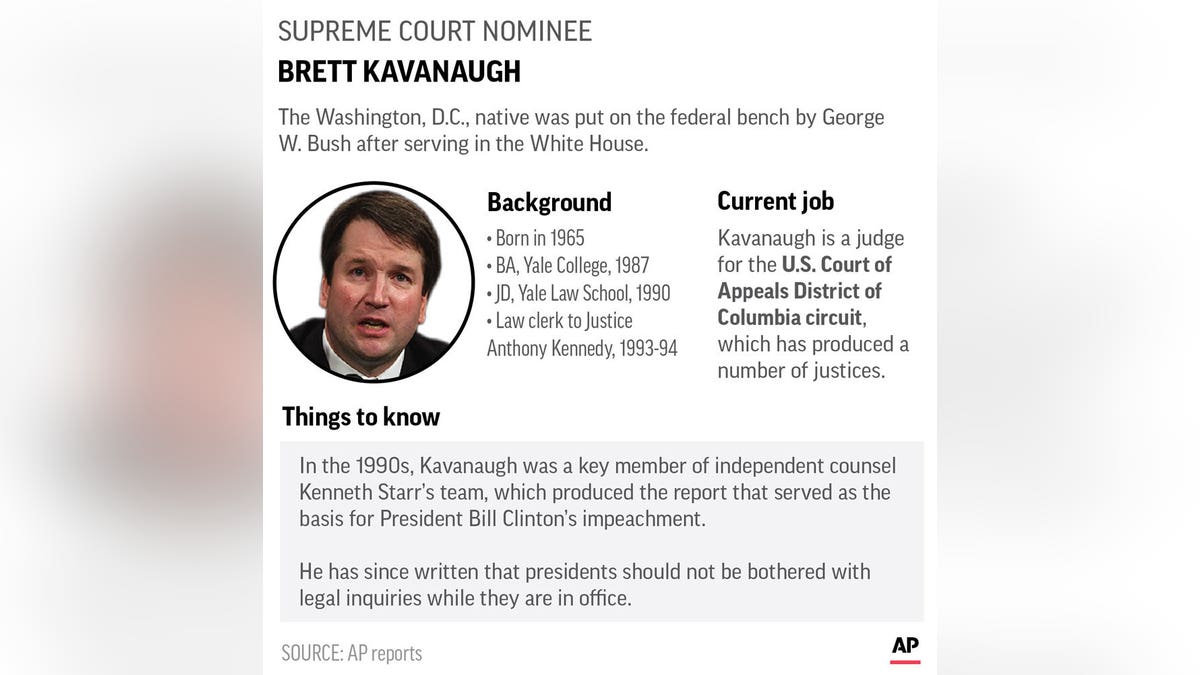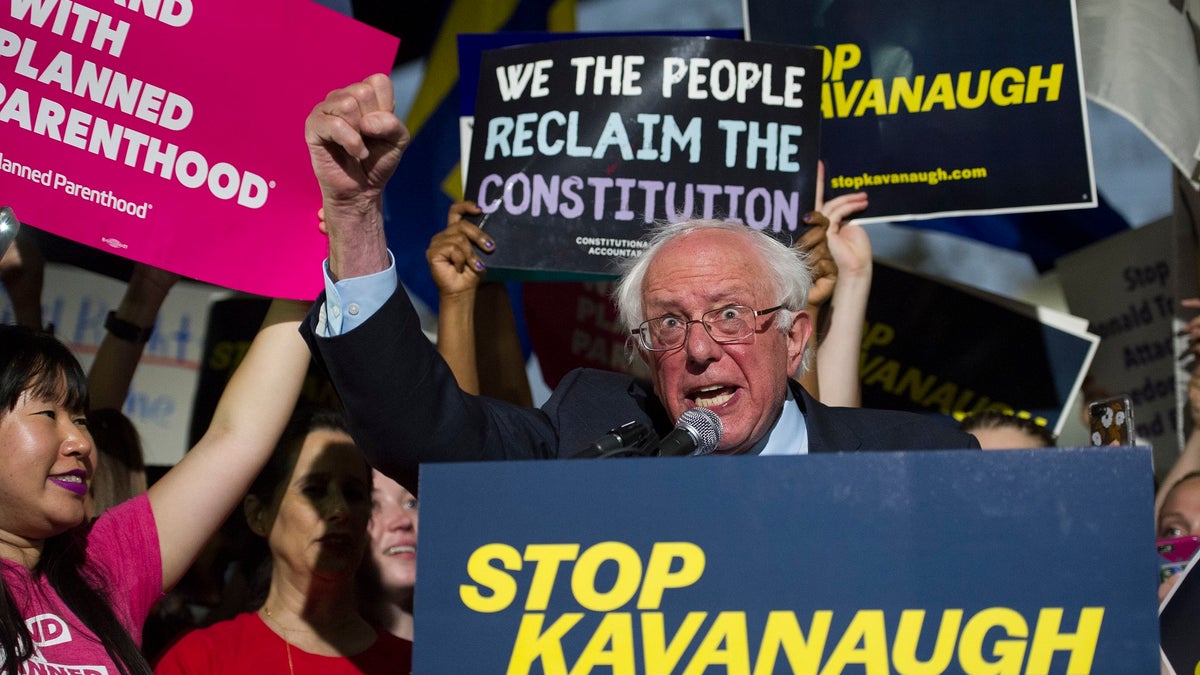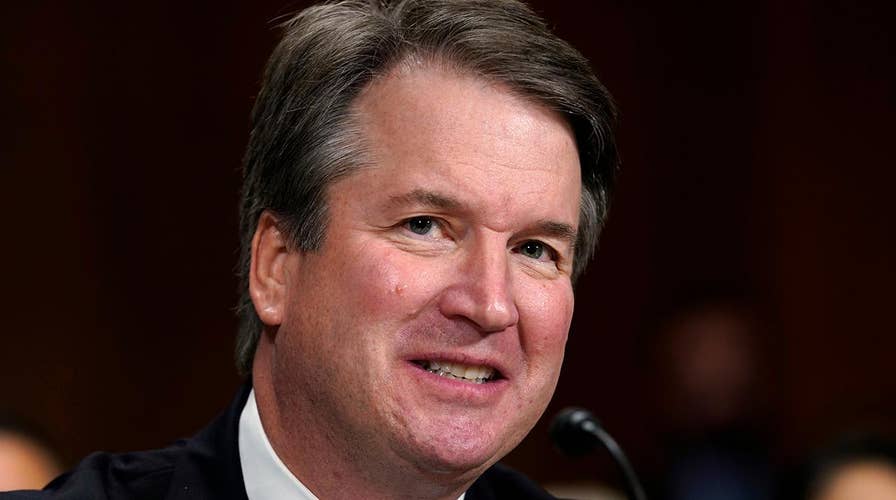Hundreds of Brett Kavanaugh’s decisions were thrust into the spotlight after President Trump formally selected him to fill former Supreme Court Justice Anthony Kennedy's seat. Kavanaugh was confirmed to the nation's highest court with a 50-48 vote on Oct. 6 — weeks after sexual misconduct allegations against the judge took center stage in the Senate chambers.
Kavanaugh, 53, formerly clerked for Kennedy and was elevated to the powerful federal appeals court in the District of Columbia by former President George W. Bush, under whom he had also served as a White House lawyer and staff secretary.
Here's a look at some of Kavanaugh's decisions that were examined and discussed throughout the confirmation process.
Gun rights
In his 12 years as a judge, Kavanaugh has issued approximately 300 opinions and delivered numerous speeches and legal arguments. Among them is his dissenting opinion on a pivotal gun ban in 2001.
In Heller v. District of Columbia, the D.C. Circuit Court upheld the District’s ordinance banning most semi-automatic rifles. But in that case, Kavanaugh wrote the dissenting opinion, arguing the Supreme Court had already decided handguns – “the vast majority of which today are semi-automatic” – are constitutionally protected under the Second Amendment.
He said despite gun violence in the area, “our task is to apply the Constitution and the precedents of the Supreme Court, regardless of whether the result is one we agree with as a matter of first principles or policy.”
The Supreme Court eventually took the case and struck down the ordinance; it held that the Second Amendment protects the possession of semi-automatic weapons for purposes unrelated to militia use.

Judge Brett Kavanaugh was appointed to the federal bench by former President George W. Bush.
The National Rifle Association applauded Kavanaugh’s nomination as its president, Chris W. Cox, cited his “impressive record that demonstrates his strong support for the Second Amendment.”
On the other side, the Giffords Law Center to Prevent Gun Violence derided the pick, saying he has “issued prior rulings that are ideologically aligned with the gun lobby and reflect a radical interpretation of the Constitution under which public safety justifications play no role in Second Amendment jurisprudence.”
But aside from gun-related legislation, lawmakers will have to sift through Kavanaugh’s rulings on countless other issues as they decide whether to confirm him to the nation’s highest court. Read on for a look at other opinions or decisions Kavanaugh is sure to be asked about as he goes before the Senate for his confirmation hearing.
Abortion
Although he has not expressed outright opposition to abortion, liberals have warned of the end of Roe v. Wade, the landmark Supreme Court decision that legalized abortion, with Kavanaugh's confirmation.
Kavanaugh did, however, issue a dissent in a 2017 case involving an illegal immigrant who wished to be released from custody in order to obtain an abortion. While the court eventually allowed her to have the procedure, Kavanaugh said the majority opinion was “radically inconsistent with 40 years of Supreme Court precedent.”
A LOOK AT THE SUPREME COURT CONFIRMATION PROCESS
He argued if the government helped the 17-year-old obtain an abortion, then it ignores its "permissible interest in favoring fetal life, protecting the best interests of a minor and refraining from facilitating abortion.”
Despite his dissent, Kavanaugh’s words irked some anti-abortion conservatives who felt as though he did not go far enough. During oral arguments, Kavanaugh suggested releasing the teen to a sponsor which would “solve the government’s objection” and allow her to get an abortion.
Phillip Jauregui, president of the Judicial Action Group, said the case “exemplifies why Kavanaugh is not the best available Supreme Court prospect” in a memo last month.
Trump has said he did not discuss abortion with Kavanaugh.
The Women’s March called the choice of Kavanaugh “a death sentence for thousands of women in the United States.”
“Stripping a woman’s ability to make decisions about her own body is state violence,” the group said. “We cannot let this stand. We will raise our voices and take to the streets.”
ObamaCare
Kavanaugh’s role in an ObamaCare decision had some conservatives on edge prior to his official nomination. As Fox News previously reported, Kavanaugh ultimately dissented in Seven-Sky v. Holder, a challenge to the Affordable Care Act.
However, in his dissent, Kavanaugh did acknowledge the Affordable Care Act’s “individual mandate provision” could fit “comfortably within Congress’ Taxing Clause power.”
Conservative health care expert Christopher Jacobs argued Kavanaugh “cultivated a theory” that paved the way for Chief Justice John Roberts to uphold the individual mandate requiring people to purchase health insurance in 2012.
“Even as he avoided a definitive ruling on the merits of the case, Kavanaugh revealed himself as favorably disposed to the mandate,” Jacobs wrote for The Federalist.
Religious liberty
In 2015, Kavanaugh sided with organizations that argued ObamaCare’s contraceptive coverage mandate infringed upon their religious rights.
“When the Government forces someone to take an action contrary to his or her sincere religious belief (here, submitting the form) or else suffer a financial penalty (which here is huge), the Government has substantially burdened the individual’s exercise of religion,” Kavanaugh wrote in the dissenting opinion in Priests for Life v. HHS.

Sen. Bernie Sanders, I-Vt., speaks with protesters in front of the Supreme Court after President Trump announced Judge Brett Kavanaugh as his Supreme Court nominee. (AP Photo/Cliff Owen)
At issue here was the form organizations were required to provide to the insurer or federal government in order to be exempt from a monetary penalty levied if they did not wish to include contraceptives in their insurance coverage. After a form is filed, then the insurer will still offer contraceptive coverage for employees through separate funds provided by the government or insurer. But religious organizations argued it made them complicit in providing coverage for contraceptives, thus violating their religious beliefs.
Russell Moore, president of the Ethics & Religious Liberty Commission of the Southern Baptist Convention, said he is “confident” Kavanaugh “will be a strong defender of the freedoms guaranteed by the Constitution and Bill of Rights, especially our First Freedom of religious liberty.”
Presidential protections
Kavanaugh worked with Kenneth Starr in the 1990s, co-writing the independent counsel’s report laying out the legal framework supporting then-President Bill Clinton’s impeachment. He said Clinton should be impeached because he misled the public and lied to his staff, according to The New York Times.
But in 2009, citing his role with the investigation into Clinton, Kavanaugh expressed his opinion that presidents should not have to deal with criminal investigations or civil lawsuits while in office.
WHO ARE THE SUPREME COURT JUSTICES?
Writing for the Minnesota Law Review, Kavanaugh said, “I think we grossly underestimate how difficult the job [of U.S. president] is.” Because of that, he said he believes “[it's] vital that the President be able to focus on his never-ending tasks with as few distractions as possible.”
"The nation certainly would have been better off if President Clinton could have focused on Osama bin Laden without being distracted by the Paula Jones sexual harassment case and its criminal investigation offshoots."
“Looking back to the late 1990s, for example, the nation certainly would have been better off if President Clinton could have focused on Osama bin Laden without being distracted by the Paula Jones sexual harassment case and its criminal investigation offshoots,” Kavanaugh said.
Kavanaugh said criminal investigations and civil lawsuits should simply be deferred – not eliminated – until he is out of office.
“Even the lesser burdens of a criminal investigation – including preparing for questioning by criminal investigators – are time-consuming and distracting. Like civil suits, criminal investigations take the President’s focus away from his or her responsibilities to the people,” he said. “And a President who is concerned about an ongoing criminal investigation is almost inevitably going to do a worse job as President.”
Fox News’ Alex Pappas, Gregg Re and The Associated Press contributed to this report.





















